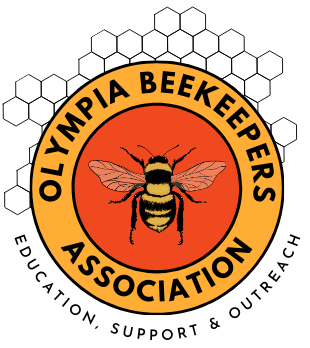
OBA Treasurer. Other positions previously held include: Acting President, Vice President & Speakers Coordinator
OBA Member – 18 years (Since 2005!)
Fun fact – Bees have the ability to distinguish numbers. Check out this Science News article “Honeybees order numbers from left to right…” from October, 2022. The article informs readers about a study related to trained honeybees recognizing and preferring smaller versus larger number options. I think the article may highlight pretty good neurological activity for a brain the size of a sesame seed!
Q: How long have you been a Beekeeper?
A: About 20 years. I felt like a real Beekeeper after I successfully overwintered a colony which occurred with a lot of effort, time, and luck.
Q: Describe why you became a Beekeeper and your overall beekeeping strategy.
A: I gained interest in beekeeping when my wife and I bought land and explored being off the grid as much as possible. I thought beekeeping would supplement whatever else we could grow and provide a source of sugars for beer, canning and wine.
My general beekeeping strategy is to disturb the colony as little as possible. I spend time watching the bees come in and out of the hive, and I check the slider every 2-3 days to see what debris there is. When I find an issue, like the first mite drop – then I attack the problem on a heavy basis.
Q: What do you love most about bees & beekeeping?
A: Not getting stung! And it’s a way to look and see how nature operates. Beekeeping is a hobby that I enjoy sharing with my older son.
Q: What kind of hives do you use and how many do you keep?
A: Standard Langstroth,10 frame, mostly westerns and shallows, not very many deeps. I converted most of the deeps to storage boxes because it is easier to deal with the shallows. Three shallows of brood is the same as two deeps and then my hives are more interchangeable. This allows more flexibility. I’m a backyarder and keep 1-2 hives. In 2021, I had two hives that went down and I harvested 40 pounds of honey, enough to make 2-3 batches of mead.
Q: What is your biggest beekeeping challenge you have overcome and how did you overcome it?
A: Those pesky Varroa mites. I try to overcome it by being very aggressive when I see them. I use OA – and usually more than what is recommended.
Q: What are your biggest beekeeping accomplishments or successes?
A: Getting the one colony through the winter. Yahoo! Then, I got an accidental split off of that hive. That was a fun day!
Q: Describe your role with OBA and how members can connect with you to learn more.
A: Currently, I’m the Treasurer and do the treasurer things. I started out with OBA coordinating speakers for presentations of the meetings. Then I had a hand in the rewriting of bylaws which was such a good experience. I try to contribute where I can. I’ve been Vice President and acting President in the past. Members can connect with me at treasurer@olympiabeekeepers.org.
After enduring the pandemic, I believe the club is making great strides to fulfill its mission. We are embracing and relying more on technology and working to engage with and build back our membership.
Q: How have you benefited from being a member of OBA?
A: The knowledge, understanding and shared experience that you get from others is the primary benefit for me.
Q: What do you like most about being a member of OBA?
A: I like the education and the social end of things. I like to get together with other people that are interested in what I am interested in and I like that it generates a sense of community.
Q: What tips or advice do you have for new beekeepers?
A: Use screened bottom boards. They are a great analytic tool to use without having to open the hive and disturb the bees. Learn to interpret the debris and you can see what is going on in the hive. I also painted my bottom boards green which seems to keep bees at the entrance instead of trying to get under it. Most of all, keep at it! Don’t get discouraged when you have a dead hive.
